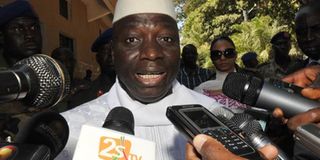Gambia's Jammeh must go, says UN

Gambian leader Yahya Jammeh . AFP PHOTO
What you need to know:
- Last year Jammeh fired a number of top judges after they commuted several death sentences.
- The lack of a deal has come as a blow to the opposition, which had hoped Jammeh would leave power within a month under international pressure.
The UN's west Africa envoy on Wednesday said Gambian leader Yahya Jammeh must step down as soon as his mandate ends in January to allow election winner Adama Barrow to take office.
Mohamed Ibn Chambas said that Jammeh, who is contesting his presidential election defeat, had the constitutional right to remain in office until his five-year term ends on January 19.
"Between now and January 19 it is Mr Jammeh that is the constitutionally elected president," he told AFP in Dakar, Senegal. "By January 19 he should be ready to hand over power."
Jammeh, who has ruled the country for 22 years after seizing power in a coup, initially conceded defeat to opposition leader Barrow in the December 1 poll but in a U-turn subsequently rejected the official results.
On Tuesday, his party issued a legal challenge, while Barrow called for the president to step down "now".
Commenting on opposition worries that Jammeh could try to cling on to power pending the outcome of the legal case lodged by the ruling Alliance for Patriotic Reconciliation and Construction (APRC), Chambas said:
"That legal process has nothing to do with the term of his mandate."
His spokesman earlier told AFP that the ongoing police occupation of The Gambia's Independent Electoral Commission (IEC) -- the object of the APRC's legal complaint -- was an "unacceptable act".
In New York, UN Secretary General Ban Ki-moon too condemned the IEC's takeover and called on security forces to immediately leave the premises.
Ban "condemns this outrageous act of disrespect of the will of the Gambian people," his spokesman said in a statement.
"This action violates the independent status of the IEC under the Gambian constitution, and could compromise the sensitive electoral material under the commission's custody," he added.
"He calls on the Gambian military and security forces to immediately vacate the IEC premises."
IEC chairman Alieu Momar Njie told AFP on Wednesday that he had not yet been informed why he was locked out of his own premises.
He further dismissed Jammeh's legal challenge of the IEC's election result as unworkable because of the lack of judges in the Supreme Court, which is the body mandated to decide on cases of electoral law.
"The only way they can pursue the commission is through the court, and there is no court," Njie said.
Court boycott
Last year Jammeh fired a number of top judges after they commuted several death sentences.
To meet the deadline of January 18 required for Jammeh's case to be heard before the end of his tenure, he would need to appoint as many as six judges to the Supreme Court, which has lain dormant since May 2015.
Lawyers continued a planned boycott of the court system on Wednesday in protest at Jammeh's legal fight.
The country's most influential lawyers' group, The Bar Association, has said any appointment of judges by Jammeh to decide on a case involving himself would be fundamentally unjust.
An opposition leader, Halifa Sallah, also raised the January 19 deadline in a statement to reporters in Banjul.
"We maintain that president-elect Barrow continues to be the next Gambian president, who should take office the day that (Jammeh's) mandate expires," Sallah said.
"We have said that starting from January 19... if President Jammeh says 'I will not leave', then there will clearly be a constitutional crisis and most probably a conflict in this country," he warned.
Liberia's President Ellen Johnson Sirleaf said on Tuesday that a heavyweight delegation of four African leaders including herself had failed to reach a consensus with Jammeh and Barrow on a transition of power.
"We come to help Gambians find their way through a transition. That's not something that can happen in one day," said Sirleaf, who headed the team of four African heads of state and the UN's Chambas.
The lack of a deal has come as a blow to the opposition, which had hoped Jammeh would leave power within a month under international pressure.




